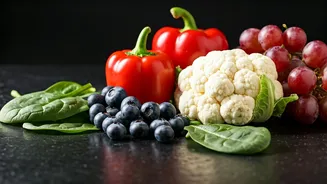Kidney Health Explained
The kidneys are indispensable organs, serving as the body's natural filters and responsible for waste removal. They diligently purify the blood, eliminating
toxins and surplus fluids through urine. Beyond filtration, kidneys regulate blood pressure, stimulate red blood cell production, and maintain mineral balance. Kidney diseases, ranging from chronic conditions to acute injuries, can disrupt these essential functions. Understanding the crucial role of the kidneys is the first step in appreciating the importance of supporting their health. Factors such as genetics, lifestyle choices (including diet), and underlying medical conditions can impact kidney function. Proactive measures, such as a balanced diet, regular hydration, and routine check-ups, are vital for maintaining kidney health and preventing complications. By understanding how the kidneys work and adopting healthy habits, you can significantly reduce your risk of kidney disease and enhance your overall well-being. Focusing on a diet that favors kidney function is an essential part of this effort, and the following foods are a great start.
Red Bell Peppers
Red bell peppers are packed with nutrients that can benefit kidney health. They are a good source of vitamins A, C, B6, and folic acid, while being low in potassium. High levels of potassium can be problematic for people with kidney disease, making red bell peppers a favorable choice. These colorful vegetables also contain antioxidants that help protect the kidneys from damage. Whether enjoyed raw in salads, roasted with herbs, or added to stir-fries, red bell peppers provide a flavorful way to support kidney function. Their versatility makes them easy to incorporate into various meals. They also have an appealing flavor profile that can complement a wide array of dishes. Including red bell peppers in your diet can contribute to overall health and well-being. Remember that the combination of low potassium, high vitamins, and antioxidant properties makes red bell peppers an excellent addition to a kidney-friendly diet. You'll find these easily available in most markets, adding them to your daily diet will not be difficult.
Cabbage is Great
Cabbage is a fantastic addition to a kidney-friendly diet. This cruciferous vegetable is low in potassium, making it safe for individuals managing kidney disease. It provides essential vitamins and fiber, contributing to digestive health. Cabbage is also a source of phytochemicals, which are plant compounds known for their antioxidant and anti-inflammatory effects. These can help protect against cellular damage and support overall kidney function. Versatile in the kitchen, cabbage can be enjoyed raw in coleslaw, fermented as sauerkraut, or cooked in soups and stews. Its subtle flavor and crunchy texture make it an easily adaptable ingredient. Furthermore, the fiber content in cabbage aids in managing blood sugar levels and promoting heart health. Regular consumption of cabbage can support kidney health while also contributing to overall well-being. It is an affordable and accessible food item, making it easy to incorporate into daily meals. Consider it a simple yet effective way to support your kidney function and enhance your health.
Cauliflower's Benefits
Cauliflower, another cruciferous vegetable, brings valuable benefits to kidney health. Like cabbage, it is low in potassium, making it suitable for those with kidney concerns. Cauliflower is a source of vitamins C, K, and folate, as well as fiber, all of which support overall health. It also contains compounds that help detoxify the body. Incorporating cauliflower into your diet can be done in many ways: roasted, steamed, or mashed as a healthier alternative to potatoes. Its mild flavor makes it an easy addition to various recipes. Cauliflower's fiber content aids digestion, while its antioxidant properties contribute to protecting cells from damage. Regular consumption can support kidney function and promote overall health. It's an excellent choice for those wanting to maintain a balanced diet that supports their kidneys. It offers a multitude of nutrients and contributes to overall wellness. The versatility of cauliflower makes it a valuable addition to your dietary choices.
Onion Powerhouse
Onions add both flavor and health benefits to a kidney-friendly diet. They are low in potassium and rich in flavonoids, particularly quercetin, which possesses potent antioxidant properties. Onions help cleanse the kidneys by removing waste. These antioxidants can help protect against cell damage and support overall kidney function. Onions can be used in numerous ways in cooking. Add them raw to salads, sautéed in dishes, or as a base for soups and stews. Their distinct flavor enhances the taste of various meals. Onions also have anti-inflammatory and antibacterial properties, contributing to overall health. Their presence in the diet can enhance kidney health while offering a culinary boost. The combination of nutrients and antioxidants makes onions a valuable addition. They're also an affordable and accessible ingredient, allowing you to easily add them to your meals. Make onions a part of your daily food intake for better kidney and overall health.
Garlic's Advantages
Garlic, a culinary staple, offers health advantages for the kidneys. Garlic is low in potassium and contains allicin, a compound with potent antioxidant and anti-inflammatory properties. These properties help protect the kidneys from damage and support their overall function. Garlic can be used in almost all recipes as a flavor enhancer. Besides its culinary uses, garlic also has antibacterial and antiviral effects. Its inclusion in your diet may contribute to improved kidney function and overall well-being. Garlic can be easily added to a variety of dishes, enhancing flavor while providing health benefits. It is also an easily accessible ingredient that can be incorporated into daily meals. Incorporating garlic into your diet can be a flavorful and effective way to support your kidneys, helping them stay healthy. Make use of this beneficial ingredient today for your health needs.













